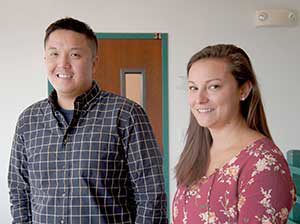
By Colleen Morrissey
A new grant-funded program is exploring the value of giving Home Care case managers more flexibility to assist clients with complex medical and social needs.
Somerville-Cambridge Elder Services (SCES) is participating in the Community Living Coaches pilot project, which is evaluating benefits of assigning fewer clients for case managers who handle chronic conditions, multiple hospitalizations, difficulty managing medications, and daily assistance. The program was launched in August, and Home Care Director Rachel Berry is already optimistic about the potential benefits.
“We really believe in this,” said Berry. “Case management shouldn’t be a one-size-fits-all program. Some people need less attention, some need more. For people with complex medical needs, we believe a coach can help actually improve health outcomes.”
The pilot is funded by the Executive Office of Elder Affairs and sponsored by Mass Home Care. Over the course of the yearlong program, researchers at the Gerontology Institute at University of Massachusetts Boston will analyze data provided by clients for changes in their health and wellbeing.
The pilot also seeks to integrate clients’ medical and social care to deliver better results. The project will benefit from SCES’ close partnership with the Cambridge Health Alliance (CHA), allowing case managers and medical personnel to coordinate client needs. Berry pointed to SCES’ relationship with CHA as a likely factor in winning the grant.
“They were excited to partner with us on the pilot,” she said.
Case manager Kaylin Congdon is the designated Community Living Coach at SCES and has taken on a relatively small caseload of 25 clients who meet the pilot’s criteria. There is also a control group of clients, randomly selected and coordinated by case manager Viet Van. These clients also fit the criteria, but are spread out among case managers who have the usual amount of clients, typically between 90 and 100. Client services vary from assistance cleaning their homes once or twice a week to help with bathing and getting dressed each day.
Case managers in both the control and coaching group began with the standard assessment for the Home Care program, and posed additional questions to clients about their well-being and their medication compliance. Researchers will eventually balance these answers against updates from clients after six months and a year of the pilot.
Congdon will be able to contact clients weekly. By contrast, case managers in the control group typically contact clients every three months and visit them two to four times each year.
Berry anticipates that the coaching model will have a positive impact on clients’ lives, and hopes the strategy will continue past the pilot.
“It would be better for clients, and better for us,” said Berry.
Colleen Morrissey is a Resource Specialist at SCES.












Reader Comments